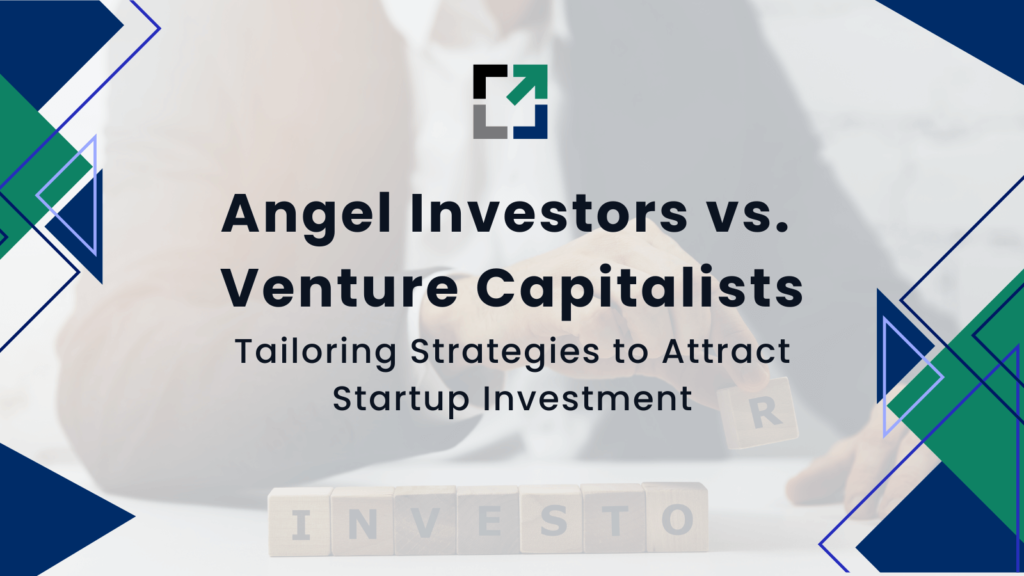When considering financing options for your startup, you may have come across the terms “angel investors” and “venture capitalists.” While both types of investors fund businesses in exchange for a share of ownership, they differ in several key aspects.
While both invest in exchange for equity, angel investors typically provide smaller amounts early on, while venture capitalists offer more significant investments later.
Deciding whether to approach angel investors or venture capitalists for financing depends on several factors, including the stage of your startup, the amount of capital needed, and your growth objectives.
We will discuss how to attract angel investors. But before we can do so, we must understand the basic terminologies and differences.
Angel Investors:
Angel investors inject capital into startup businesses in exchange for equity ownership. They typically operate independently or as part of angel networks. While they may not provide initial seed funding, they often invest in early-stage companies. On average, angel investors contribute smaller amounts, averaging around $330,000. Apart from funding, they also offer mentorship and guidance to the startups they invest in. The best way to find angel investors is by strengthening your startup. Startups should focus on building relationships, demonstrating growth potential, and being open to mentorship opportunities.
Venture Capitalists:
Venture capitalists (VCs) are investors who fund startups by providing capital in exchange for equity. Unlike angel investors, VCs are typically part of venture capital firms, which various investors fund. VCs prefer to invest in more mature startups that have already undergone several funding rounds. On average, venture capitalists invest significantly more significant amounts, averaging around $11.7 million. They often require a substantial equity stake, typically between 25% and 50%, and may also demand a seat on the company’s board of directors. VCs prioritize high returns on investment and also focus on achieving short-term profitability.
The Difference:
Angel investors and venture capitalists differ in many key aspects:
- Investment Amount and Equity Stake: Angel investors invest smaller amounts and usually ask for lower equity stakes than venture capitalists.
- Stage of Startup: Angel investors typically fund younger, less established businesses, while venture capitalists prefer more mature startups.
- Return on Investment: Venture capitalists expect a more significant return on investment than angel investors.
- Angel investors spend more time working with and mentoring business owners than venture capitalists.
How to Attract Investors:
Research Your Target Investors:
– Identify angel investors with a track record in funding startups like yours.
– Consider factors like investment preferences, risk tolerance, and geographic location to target suitable investors.
– Utilize online platforms and local networks to connect with potential angel investors aligned with your business venture.
Craft a Strong Pitch Deck:
– Develop a visually appealing and impactful pitch deck highlighting your startup’s unique value proposition, market potential, team expertise, and financial projections.
– Use compelling graphics and data-driven insights to make a convincing argument and inspire confidence in potential investors.
– Tailor your pitch deck to resonate with angel investors, focusing on key metrics and milestones demonstrating growth potential.
Develop a Solid Business Plan:
– Create a comprehensive business plan outlining your long-term vision, goals, and growth strategy.
– Include milestones and metrics to measure progress and demonstrate scalability to potential angel investors.
– Identify potential challenges and risks and outline mitigation strategies, showcasing your preparedness and commitment to long-term success.
Network Effectively:
– Networking is the best way to attract investors. Use your existing network to obtain introductions to angel investors through social media, industry events, and startup workshops.
– Establish a professional online presence for your startup with a website and active social media profiles to attract investor interest.
– Engage in meaningful conversations and build relationships with potential angel investors to cultivate trust and credibility.
Show Traction:
– Demonstrate market traction by showcasing metrics such as user growth, revenue, partnerships, and customer testimonials.
– Highlight evidence of your startup’s success during initial investor meetings to instill confidence and reinforce your investment proposition.
Be Transparent and Honest:
– Foster transparency and honesty in your interactions with angel investors, openly discussing challenges, risks, and limitations.
– Avoid exaggeration and unrealistic promises to maintain trust and credibility with potential investors.
The Don’ts:
Send Unsolicited Emails:
– Avoid cold emailing angel investors without prior connection or introduction, as it may be perceived as spam.
Overshare:
– Safeguard sensitive information that could jeopardize your startup’s security and avoid oversharing during investor interactions.
Disregard Due Diligence:
– Be well-prepared to provide investors with necessary documents and financial statements during due diligence, maintaining transparency throughout the process.
Be Impersonal:
– Treat investors as partners and seek their expertise and advice, avoiding generic and impersonal pitches.
Don’t Pressure for Quick Decisions:
– Give investors time to evaluate your proposal and avoid pressuring them to make immediate decisions.
Neglect Follow-Up:
– Express gratitude and maintain open communication even if investors decline initially, as building relationships takes time and persistence.
In Conclusion
By implementing the mentioned strategies and adhering to best practices, startups can attract angel investors and secure the funding needed for long-term success. Startup Steroid is the best deal flow platform to find angel investors and exciting startups online. Startup Steroid’s networks offer multiple opportunities and guidance on how to attract investment.

I’m the Co-Founder of Startup Steroid, where I help founders navigate the challenges of building a startup. From connecting with the right investors and talent to guiding marketing, legal, and MVP development, I work alongside entrepreneurs to provide practical support and clarity, helping them grow their ideas into successful, sustainable businesses.





